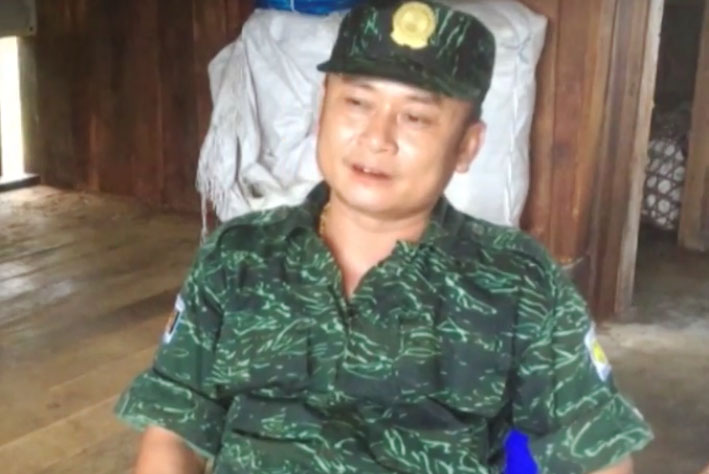As the chief-of-staff of a breakaway faction of the Democratic Karen Benevolent Army (DKBA), one of the signatories to last year’s Nationwide Ceasefire Agreement (NCA), Gen Saw Kyaw Thet says that he is open to the new National League for Democracy government’s efforts to engage non-ceasefire groups in peace talks. Meanwhile, the group — which calls itself the Democratic Karen Buddhist Army, reviving the name of the armed group that became a Border Guard Force (BGF) in 2010 — continues to clash with the Burmese armed forces and the BGF. In this interview, Saw Kyaw Thet speaks to DVB about the group’s stand on the prospects for peace with the government.
Question: Can you tell us about the current situation of the DKBA?
Answer: There have been rumours of — how do I put it? — a split. But the split shouldn’t be a big problem. I reckon people are assuming the DKBA is no more.
Q: Can you tell us how the split occurred?
A: The DKBA [under Gen Saw La Pwe] was holding negotiations with the Burmese army and the BGF, but the talks were fruitless. We [DKBA units under command of Saw Kyaw Thet and Major Saw San Aung] ended up clashing with the government forces. But after that, the DKBA signed the NCA and they began acting like they wanted nothing to do with us.
We had been expelled from DKBA once before that happened, but they reinstated us. And then we had a problem again when we clashed with government forces on the Asian Highway. Afterward, they decided to expel us again, as having us could hindered their NCA bid. We united the expelled members together to stand as the DKBA [Buddhist Army], with two brigades and one command. We appointed a chief of staff and also set up a war committee. We stand by the old principals of DKBA.
Q: How would you react if the [Benevolent Army] wants to reunite forces?
A: We have no objection to that. We would consider it.
Q: So now that we’ve formed a new group, what is your manpower? Where do you operate? What are the challenges you face?
A: We didn’t form a new group. We are the original DKBA — the Benevolent Army is the new one. We have enough troops. One of the challenges for us is our lack of understanding with the Burmese army and the BGF.
Q: What is the opinion of the Burmese army and the BGF about your group?
A: That’s not clear to us. But nonetheless, we assume it is ultimately up to the government. But we are not clear about the position of the Tatmadaw [Burmese army] and the BGF.
Q: How would you react to an offer of peace?
A: Peace is always our first priority. If we are formally approached, we will accept it.
Q: Recently, there were reports about [Buddhist Army] forces going to Arakan State to aid the Arakan Army who were fighting with government forces. Can you tell us more about it?
A: That’s correct. The Arakanese are our fellow ethnic people, and it is not just now that we are working together. We’ve fought together since back in 2010.
Q: How was the experience of fighting in Arakan state?
A: Combat is not easy — there were some challenges — but that didn’t matter. We can overcome.
Q: What do you think about working with other armed groups as well? Is there any possibility of this happening?
A: We are ready to cooperate. We’ll work together on shared goals and work separately on other objectives.
Q: What is your judgement on the new government’s peace effort?
A: It hasn’t been long since they started — it’s not even 100 days yet — but we believe that the NLD government will do its best to bring about peace.
Q: Any suggestions for the new government?
A: We believe that inclusiveness is crucial in the peace process. We can’t leave anyone behind if we are looking for genuine peace. We can only move forward when everyone is on board.
Q: The new government plans to convene the 21st Century Panglong within two months. What do you think about that?
A: It would be nice if they can. We believe they will try, but there may be challenges, different opinions. We are also sceptical about the procedure — implement Panglong first, and then amend the constitution. We think that it may be challenging going about the peace process without amending the constitution first.
Q: What is your stance on the constitution?
A: We believe that our demands for self-determination and equality cannot be fulfilled without amending the 2008 constitution.
Q: Can you tell us about recent fighting your area?
A: That’s nothing new. We are not hostile with them. We didn’t harass or disturb them but they are the aggressors provoking the fight.
[related]
Q: We also heard that the four-cut strategy is being used against your troops by the Burmese army and BGF?
A: Frankly that shouldn’t be problem. The four cut strategy doesn’t hurt us but it mostly hampers the civilian population. People can’t grow enough crops here so they have to go buy food from the town and now they are being prohibited from bringing in food to the area by the government forces. Maybe they are using the tactic to alienate us from the civilian population.
Q: Is there any message you would like to pass on to the government and the people?
A: To prioritise peace but not war. The people have to suffer when we fight. It would be the best if both sides show restraint and avoid clashes.



